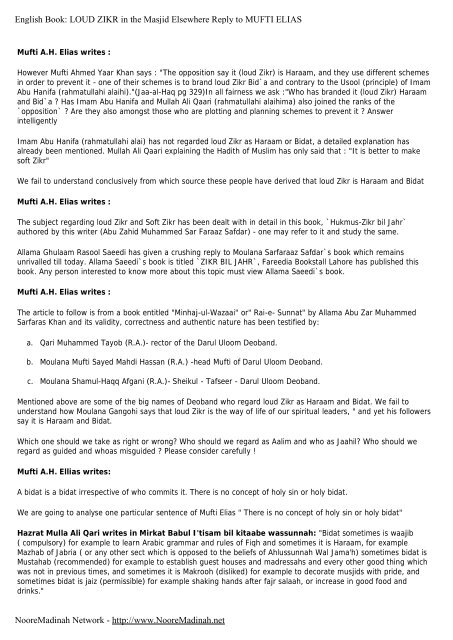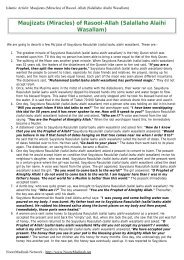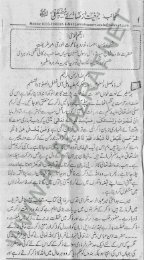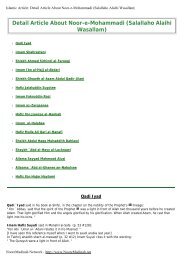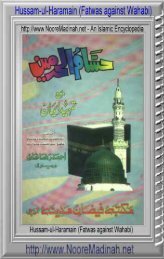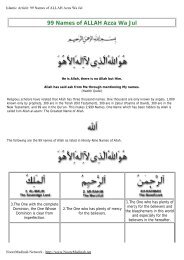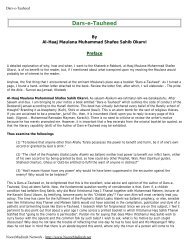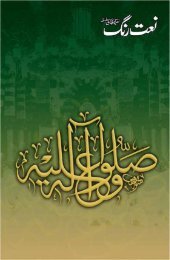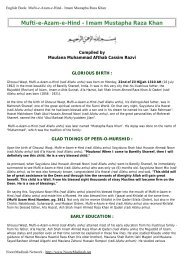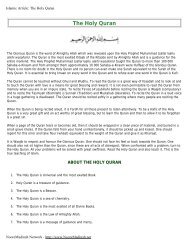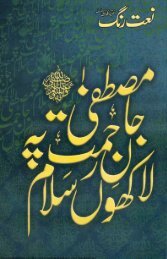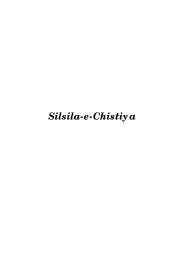LOUD ZIKR in the Masjid & Elsewhere & Reply to MUFTI ELIAS
LOUD ZIKR in the Masjid & Elsewhere & Reply to MUFTI ELIAS
LOUD ZIKR in the Masjid & Elsewhere & Reply to MUFTI ELIAS
You also want an ePaper? Increase the reach of your titles
YUMPU automatically turns print PDFs into web optimized ePapers that Google loves.
English Book: <strong>LOUD</strong> <strong>ZIKR</strong> <strong>in</strong> <strong>the</strong> <strong>Masjid</strong> <strong>Elsewhere</strong> <strong>Reply</strong> <strong>to</strong> <strong>MUFTI</strong> <strong>ELIAS</strong><br />
Mufti A.H. Elias writes :<br />
However Mufti Ahmed Yaar Khan says : "The opposition say it (loud Zikr) is Haraam, and <strong>the</strong>y use different schemes<br />
<strong>in</strong> order <strong>to</strong> prevent it - one of <strong>the</strong>ir schemes is <strong>to</strong> brand loud Zikr Bid`a and contrary <strong>to</strong> <strong>the</strong> Usool (pr<strong>in</strong>ciple) of Imam<br />
Abu Hanifa (rahmatullahi alaihi)."(Jaa-al-Haq pg 329)In all fairness we ask :"Who has branded it (loud Zikr) Haraam<br />
and Bid`a ? Has Imam Abu Hanifa and Mullah Ali Qaari (rahmatullahi alaihima) also jo<strong>in</strong>ed <strong>the</strong> ranks of <strong>the</strong><br />
`opposition` ? Are <strong>the</strong>y also amongst those who are plott<strong>in</strong>g and plann<strong>in</strong>g schemes <strong>to</strong> prevent it ? Answer<br />
<strong>in</strong>telligently<br />
Imam Abu Hanifa (rahmatullahi alai) has not regarded loud Zikr as Haraam or Bidat, a detailed explanation has<br />
already been mentioned. Mullah Ali Qaari expla<strong>in</strong><strong>in</strong>g <strong>the</strong> Hadith of Muslim has only said that : "It is better <strong>to</strong> make<br />
soft Zikr"<br />
We fail <strong>to</strong> understand conclusively from which source <strong>the</strong>se people have derived that loud Zikr is Haraam and Bidat<br />
Mufti A.H. Elias writes :<br />
The subject regard<strong>in</strong>g loud Zikr and Soft Zikr has been dealt with <strong>in</strong> detail <strong>in</strong> this book, `Hukmus-Zikr bil Jahr`<br />
authored by this writer (Abu Zahid Muhammed Sar Faraaz Safdar) - one may refer <strong>to</strong> it and study <strong>the</strong> same.<br />
Allama Ghulaam Rasool Saeedi has given a crush<strong>in</strong>g reply <strong>to</strong> Moulana Sarfaraaz Safdar`s book which rema<strong>in</strong>s<br />
unrivalled till <strong>to</strong>day. Allama Saeedi`s book is titled `<strong>ZIKR</strong> BIL JAHR`, Fareedia Bookstall Lahore has published this<br />
book. Any person <strong>in</strong>terested <strong>to</strong> know more about this <strong>to</strong>pic must view Allama Saeedi`s book.<br />
Mufti A.H. Elias writes :<br />
The article <strong>to</strong> follow is from a book entitled "M<strong>in</strong>haj-ul-Wazaai" or" Rai-e- Sunnat" by Allama Abu Zar Muhammed<br />
Sarfaras Khan and its validity, correctness and au<strong>the</strong>ntic nature has been testified by:<br />
a. Qari Muhammed Tayob (R.A.)- rec<strong>to</strong>r of <strong>the</strong> Darul Uloom Deoband.<br />
b. Moulana Mufti Sayed Mahdi Hassan (R.A.) -head Mufti of Darul Uloom Deoband.<br />
c. Moulana Shamul-Haqq Afgani (R.A.)- Sheikul - Tafseer - Darul Uloom Deoband.<br />
Mentioned above are some of <strong>the</strong> big names of Deoband who regard loud Zikr as Haraam and Bidat. We fail <strong>to</strong><br />
understand how Moulana Gangohi says that loud Zikr is <strong>the</strong> way of life of our spiritual leaders, " and yet his followers<br />
say it is Haraam and Bidat.<br />
Which one should we take as right or wrong? Who should we regard as Aalim and who as Jaahil? Who should we<br />
regard as guided and whoas misguided ? Please consider carefully !<br />
Mufti A.H. Ellias writes:<br />
A bidat is a bidat irrespective of who commits it. There is no concept of holy s<strong>in</strong> or holy bidat.<br />
We are go<strong>in</strong>g <strong>to</strong> analyse one particular sentence of Mufti Elias " There is no concept of holy s<strong>in</strong> or holy bidat"<br />
Hazrat Mulla Ali Qari writes <strong>in</strong> Mirkat Babul I'tisam bil kitaabe wassunnah: "Bidat sometimes is waajib<br />
( compulsory) for example <strong>to</strong> learn Arabic grammar and rules of Fiqh and sometimes it is Haraam, for example<br />
Mazhab of Jabria ( or any o<strong>the</strong>r sect which is opposed <strong>to</strong> <strong>the</strong> beliefs of Ahlussunnah Wal Jama'h) sometimes bidat is<br />
Mustahab (recommended) for example <strong>to</strong> establish guest houses and madressahs and every o<strong>the</strong>r good th<strong>in</strong>g which<br />
was not <strong>in</strong> previous times, and sometimes it is Makrooh (disliked) for example <strong>to</strong> decorate musjids with pride, and<br />
sometimes bidat is jaiz (permissible) for example shak<strong>in</strong>g hands after fajr salaah, or <strong>in</strong>crease <strong>in</strong> good food and<br />
dr<strong>in</strong>ks."<br />
NooreMad<strong>in</strong>ah Network - http://www.NooreMad<strong>in</strong>ah.net


